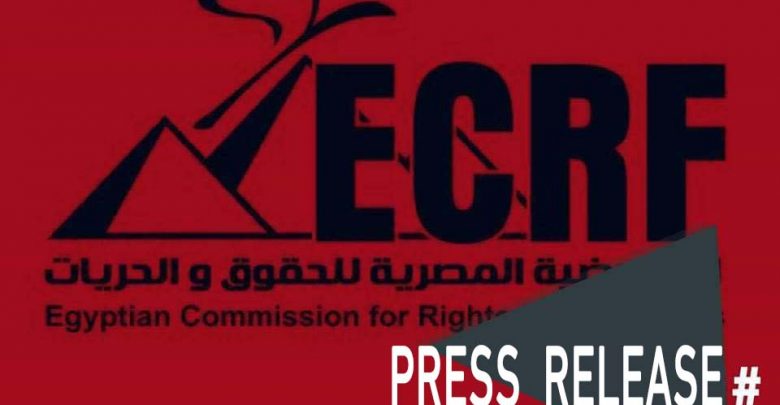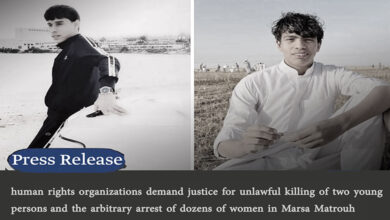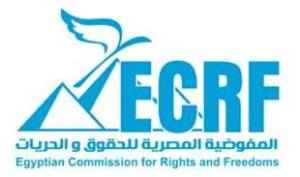Egyptian Commission for Rights and Freedoms

Towards a Society that Celebrates Pluralism and Rejects Sectarian Violence and Discrimination in Egypt: ECRF Issues Two Research Papers. The First Paper is on Sectarian Violence. The Other One is Titled “Towards an Effective Anti-Discrimination Law.”
20 April 2020
Egyptians of all religious and cultural backgrounds celebrate at this time of the year Sham El-Nessim. However, social ills of sectarian violence continue to exist. Until now, there is no effective anti-discrimination law in Egypt. Today, ECRF issued two research papers. The first one includes monitoring and analysis of incidents of sectarian violence titled “Annual Report of Incidences of Sectarian Violence: November 2018-December 2019.” The other one is a legal research paper titled “Towards an Anti-Discrimination Law.”
The first paper includes a record of incidents of sectarian violence against Coptic Christians from November 2018 to December 2019 which amounted to 13 incidents and events that constitute violations of human rights according to national legislations and international law. The paper also reveals the forms and patterns of assaults and violations which are mainly related to the building and restoration of churches, and also include two terrorist attacks, several incidents of incitement and assault, and finally the targeting of Coptic activists. Then, the paper clarifies the role of the state in the management of sectarian crises. Finally, it recounts the forms and patterns of violations of laws, the Constitution and international law in incidents tackled in the book.
The second paper is a legal research that criticizes national legislations, including the Constitution and legal provisions related to combating discrimination, in light of international human rights standards, in order to reveal existing shortcomings. It also includes a comparative review of the experiences of the Republic of Tunisia and the United Arab Emirates regarding anti-discrimination laws. The paper explains international anti-discrimination measures and mechanisms. Finally, it presents important recommendations for the drafting of an effective law for combating discrimination.
Issuing the two papers comes in the context of ECRF’s policy to monitor and document human rights violations, and to make them available to decision makers and all concerned parties believing that this is an important step for limiting human rights violations by making such references available, trying to analyze them, and making people aware of these violations, their causes and aspects of deficiency in combating them, in addition to making recommendations and suggestions for the government so that they are not repeated.
This study concluded that incidents of sectarian violence continue to frequently take on account of the lack of rule of law because of resorting to unofficial reconciliation sessions and inadequate security solutions. Regarding the building and restoration of churches, the Church Construction and Renovation Law (Law 80/2016) was enacted four years ago. It was supposed to end problem of legalization of unlicensed churches and affiliated buildings within one year from its enactment, and to facilitate the construction of new ones. However, only 1568 churches and affiliated buildings were preliminary legalized [TMT1] out of 5540 ones for which applications for legalizations were made until the date of publishing this statement.
On the other hand, the closure of churches still takes place in towns and villages of Upper Egypt according to a repeated scenario that starts with attacks on a particular church and ends with an unofficial reconciliation session that decides to close the church under the patronage of security apparatuses. Of course, the same scenario takes place when people try to build a new church. This is a clear failure of Law 80/2016 which was met by strong objections from activists and people concerned with Coptic issues since its enactment. Moreover, incidents of mass assaults on Christians for different reasons continue. This kind of assaults also ends up with unofficial reconciliation sessions that lead to impunity for perpetrators of violence and inciters, and at times forced displacement of Christian families and imposing huge fines on them. The study also shows in details different patterns existing in these assaults which constitute violations of the provisions of the Constitution and laws, and of international law. Finally, the study reveals that there is deficiency in legal provisions related to combating discrimination as there is no clear definition of discrimination, its forms and impact, and there are weak punishments for crimes of discrimination.
The state is responsible for human rights violations either by act or by omission. Individuals actually commit crimes rather than human rights violations. So, ECRF addresses Egyptian authorities with the following recommendations:
– Immediate halt of unofficial reconciliation sessions and putting the law into effect as this is the true guarantee for security and stability in society.
– Comprehensive, impartial and independent investigation of all incidents of sectarian violence mentioned, and holding those who commit them or fail to act for the protection of the victims accountable.
– Working on the enactment of an Anti-Discrimination Law with the help of experts in this field in order to issue an effective law and overcome shortcomings in existing laws. .
– Issuing a unified law for the building of places of worship that respects the rights of individuals from different religious beliefs in the practice of their religious rituals.
– Launching programs for dialogues and fostering the culture of diversity and difference among all sectors of society.
– Immediate and unconditional release of activists arrested for the defense of religious freedoms and rights of minorities.





